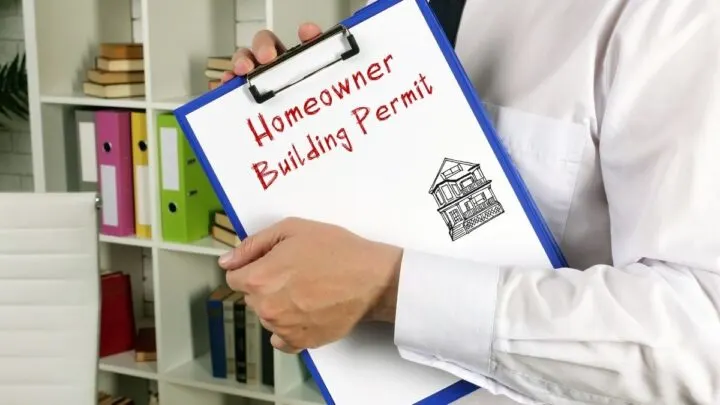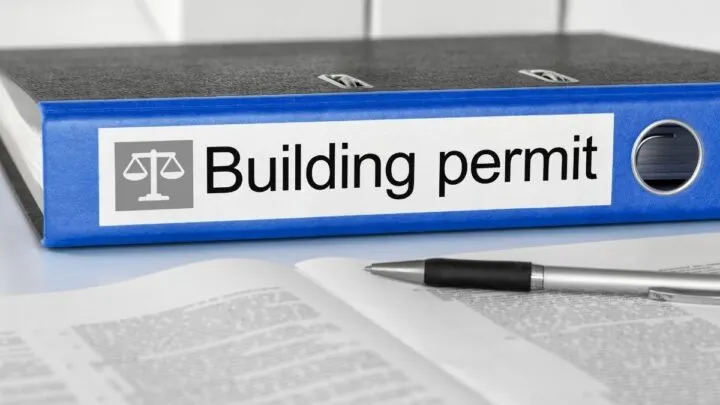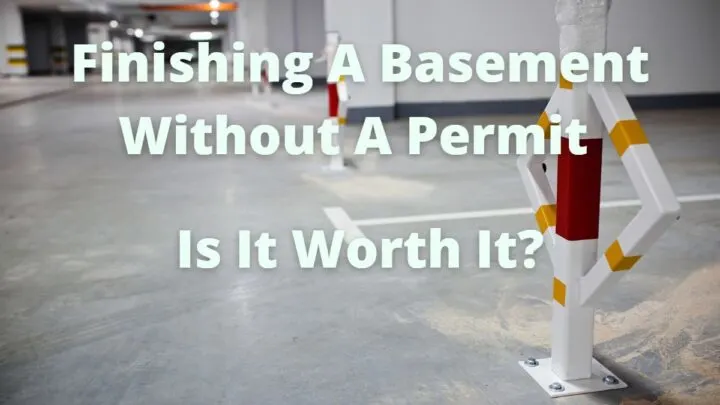If you are considering finishing your basement, you will find that getting a permit is generally required for the project, but is it worth it?
Basements are often neglected in so many homes, making them unfinished and even unused areas that could easily become homey extensions of your residence.
Finishing a basement requires a permit in virtually every city if you want to avoid potential legal issues. If you want to avoid this, obtain a permit when you’re looking to finish your basement.
A failure to do so can result in fines from your local building authority, your home’s value can decrease, or your entire development can become sabotaged.
It is very easy to overlook the fact that you need a permit to finish your basement.
This is a common development project that many homeowners pursue and they tend to only find out after the completion of their basement that they violated local building laws.
Finishing a basement comes with a lot of perks, as you are able to gain quality square footage in your home and create a comfortable living space or simply a tidier storage area.
However, the qualifications for a finished basement can often vary from place to place, which is why a lot of homeowners skip the legal process of getting a permit before beginning construction.
Depending on what kind of work you plan on doing in your basement, you may find that getting a permit is not all that important.
With that being said, if you want to avoid running into any legal issues, it is always best to fully understand what you are getting into prior to finishing your basement.
To help you understand this further, we are going to take a closer look at whether it is worth it to finish a basement without a permit.
After extensively researching basement construction protocols, I have been able to gather enough information to determine whether it is worth it to get a permit to finish this kind of project.

Is a Permit Required to Finish a Basement?
A lot of people are on the fence about obtaining a permit for finishing their basement because they can’t figure out if one is even required in the first place.
Each county and city has its own regulations on basement remodeling and construction, which is why the protocols can often be unclear.
More often than not, a permit is required when pursuing any kind of formal remodeling or construction that includes dramatically changing the design and structure of your basement.
Most regions will require you to get a permit to finish your basement if you plan on constructing or adding the following:
- Walls
- Electrical circuits
- Plumbing
- Ducts or vents
Serious basement finishing projects usually involve making the space resemble the features and aesthetics of the upstairs living area.
Any kind of laborious or dramatic transformation of your basement will pretty much always need a permit, which is why it is best to play it safe and ask before you begin development.
One of the most common oversights with basement finishing is adding drywall.
When researching basement finishing, local building authorities often specify that adding walls and changing structures requires a permit. However, simply adding drywall to your basement also needs permission.
However, there are plenty of instances where you do not need to obtain a permit when doing light finishing to your basement.
Although this can vary in each county and city, you should not expect to need a permit when:
- Adding carpet
- Painting walls
Minor cosmetic changes and additions that do not change the overall structure or accessibility of your basement will not constitute finishing.
These are basic upkeep renovations that will not interfere with a building authorities ability to inspect your property, which is why you typically do not need a permit when adding carpet or painting walls.

Finishing a Basement Without a Permit
It’s hard to consider anyone who forgets to get a permit for basement construction a legitimate criminal, which is why the legal action taken in this situation is generally not too severe.
If you are worried about facing jail time for this, that is not the course of action that will be taken for finishing a basement without a permit.
The police are not involved in basic building violations and they will not be pursuing you for failing to obtain a basement finishing permit.
Every county and city has a different bylaw for this minor offense and how they approach it will vary depending on the region that you live in, as well as how much development you finalized during your construction.
The truth is that there are plenty of homeowners that decide to finish their basements without obtaining a permit beforehand.
This is either due to negligence or oversight and a lot of the time, they can get away with it.
If you are not planning on selling your house or having any home inspections, you may be able to get by without a permit, especially if you are considering minor finishing.
However, we always recommend playing it safe when it comes to legal consequences that could jeopardize the value of your home or sabotage your development project altogether.
To skip the headache of dealing with problems down the line, check to see what the protocol is for finishing a basement in your area and get a permit if needed.
Getting a permit can cost anywhere from $200 to $1,000 in most regions, but the potential penalties that you can face as a consequence of failing to obtain a permit can be considerably higher than this.
Consequences of Finishing a Basement Without a Permit
As we mentioned, you will likely not be facing any serious legal action for failing to obtain a permit when finishing your basement.
However, there are a number of repercussions that you can run into if your local building authority finds out about your development.
Each county and city has different bylaws about finishing a basement, which is why you should always understand the regulations that are in place for your local area.
Let’s take a closer look at the potential consequences of finishing a basement without a permit.
Fines
More often than not, the course of action that your local building authority will take in this situation is issuing you a fine.
The amount of money that you pay for this kind of fine can vary greatly depending on your region.
Each state, county, and city approaches development/building violations differently, which is why you can expect the price of a fine to fluctuate based on the regulations that your local area has in effect.
Generally, a fine will be about $200 – $1,000, but they can get even higher than this in some places.
The amount of money that you end up paying for your fine will also be influenced based on the amount of development that you finalized and how severely it violates your local building laws.
Minor basement finishing projects are often slapped with a small fine and the case is closed right then and there.
However, major finishing projects that violate serious building laws can become rather costly, resulting in homeowners needing to pay thousands of dollars.
The trouble with these kinds of violations is that a fine is often just the first repercussion of the finished basement.
If that is the case with your basement, you may end up facing additional legal action and financial consequences on top of your initial fine.
Removal of Finished Work
When homeowners pursue major basement finishing projects without obtaining a permit, they often violate serious building regulations that would not have been approved by their local municipality.
This is often one of the most frustrating situations to find yourself in as a homeowner, as the building inspector may require you to remove all finished work that you did to your basement.
You will need to disassemble and/or demolish any of the development features that are involved in the violations.
This results in a complete waste of time and money on your development that can easily amount to thousands of dollars.
If you are forced to remove all finished work, your local building authority will most likely also issue you a fine.
Your municipality generally gives you a certain amount of time to remove all of the finished work.
A failure to remove the work before the next inspection date will result in additional fines.
Reduced Home Value
If you did not get a permit for your finished basement, this may end up affecting the overall value of your home.
The number one reason that permits are required for finishing a basement is that your municipality needs to ensure that you are handling your development up to code so that all safety standards can be met.
Depending on the layout of your home and what your development plans are, your finished basement could be violating any number of safety protocols.
What makes this matter so challenging is that you have no way to prove to your potential buyers that your basement meets local safety standards.
Most aspiring homeowners will want to look at any inspections that were conducted on your property, or they may even wish to have the home inspected prior to buying it.
If you did not obtain a permit for your finished basement, you will have no way to prove that the integrity of your basement is intact.
This can result in your potential buyers making you an offer that is lower than what you would like to receive for your home.
In addition, this kind of scenario can prove to be a red flag for a lot of buyers and they may decide to back out of the deal altogether.

Insurance Issues
If you have home insurance or are planning on obtaining coverage in the future, you may run into serious issues with your provider in case of an incident.
Insurance companies are thorough with inspection procedures and only offer coverage to homeowners who have all of their legal documents in order, which includes basement permits.
When disaster strikes and serious damages are done to your home, your basement may not end up getting covered. This can result in thousands of dollars being lost due to a simple oversight such as forgetting to obtain a permit.
With that being said, you may find yourself in a position where you are seeking home insurance later on down the line.
Your insurance provider will want to conduct a thorough inspection of your home before signing on, which is when they will notice that you do not have a permit for your finished basement.
Although the insurance company may still give you coverage, they could charge you a higher rate than normal.
Given that municipalities have permits in place to adhere to safety protocols, your insurance provider is going to be taking on a bigger risk by giving you coverage in an environment that may potentially be dangerous.
If you find yourself in this situation, your increased insurance price is going to be considerably higher than the fees of dealing with your initial permit costs for your finished basement.
Condemned Home
If you are not a professional builder and are unable to properly assess the condition of your basement before you start your development, then there is a chance that some serious damage can occur to the structure and foundation of your home.
When this occurs, entire homes can end up getting condemned due to safety risks.
A condemned home as a result of a finished basement project is a rarity, but it is not unheard of.
If you are remodeling or finishing a basement in a home that is well intact, then odds are that you will not run into this issue.
However, if you are finishing a basement in an older home or are taking on a very ambitious development project without first obtaining a permit, you can end up causing irreversible damage to your house.
One of the most common reasons that a home gets condemned in this situation is when damage is done to the infrastructure of the building.
This can pose some serious safety risks such as your home potentially collapsing.
If your municipality finds out about this, they can formally condemn your home and force you to vacate the property.
With that being said, if the damage can be reversed and the safety of the home can be restored, the building authority will likely give you a date until you can fix the issue to lift the condemned status.
Obtaining a Permit for a Finished Basement
A lot of homeowners find themself in a position where they have a finished basement to deal with and no permit in place.
This is generally due to an oversight where the homeowner simply forgets to request a permit prior to development.
However, this also happens when a new homeowner buys a property and does not request a copy of the finished basement permit.
Regardless, of what your situation is, you should be able to obtain a permit for your finished basement so long as all of the right conditions are met.
You will need to apply for a retroactive permit through your local building authority.
Each state has its own process for obtaining this permit and you will need to research the steps that you need to take for your region.
The cost for this kind of permit can sometimes be steep, with most municipalities charging anywhere from $2,000 to $8,000.
A representative from your local building authority will inspect your finished basement and will issue you a retroactive permit if all aspects of the build are in order.
The trouble with these kinds of inspections is that in order for the representative to properly assess your finished basement, they need to check the condition of the space prior to any development.
This usually implies that they need to evaluate the state of your walls, which can be problematic if you have put up drywall.
In this case, they need to remove a part of the drywall and any insulation that was installed – resulting in minor damages to your finished basement.
Summing Up If You Need a Permit For Finishing a Basement
While many people either don’t realize or don’t care that they need a permit to finish their basement, the answer is yes – all homeowners looking to finish their basement should obtain a permit prior to starting work.
This can help avoid legal fees and headaches later on, especially if you’re looking to sell your home in the near future.
Obtaining a permit beforehand is easy compared to what else could happen. It’s safer and smarter to obtain a permit before starting any kind of work.
If you found this article helpful, make sure to take a look at some of my other posts linked below relating to basements!


